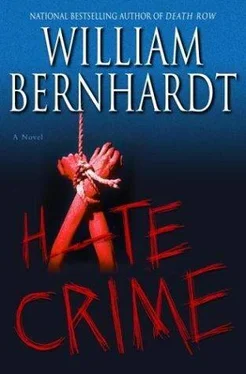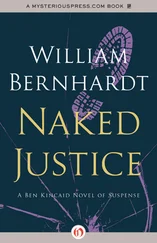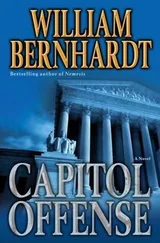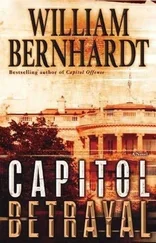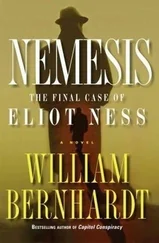One observer who was not a reporter nonetheless headed out the back doors as soon as the judge called for a recess, thinking this was not supposed to happen. Johnny Christensen had to be convicted. If these two shysters kept doing what they were doing-well-this case might never be put to rest.
Should’ve killed them before, back when they were pinned down in front of their office. Before they had a chance to stir up more trouble than they could possibly imagine.
Never mind. There were many more cheap, readily accessible handguns in the world. If the case continued to progress in this manner-and there was any chance at all of Johnny Christensen escaping punishment-the sniper scene would be reenacted. With more positive results.
Warning had been given-and ignored. There would be no more warning shots. Now it was time to shoot to kill.
Outside the courtroom window, four stories down, Christina could hear chanting. Some of the gay rights protesters were getting rowdy, it seemed. “Don’t wait-punish hate!” they chanted, over and over again. Probably heard about what just happened in court today, Christina mused. Just hope they didn’t bring their snipers this time.
“Christina?” It was Ellen Christensen, standing just behind the rail. She saw Ben flinch the instant the woman spoke. “That was wonderful, what you did up there.”
“Well, thank you.”
“Will the jury believe Johnny now?”
“We still have a lot of work to do. But we’re off to a good start.”
A new voice barked in her ear. “You should be ashamed of yourself, you cheap little hustler!”
Christina instinctively ducked. She froze. Then, not hearing any gunfire, stood back up. Was she getting jumpy? Considering all that had happened, she thought she had good cause.
It was Mario Roma, the owner of Remote Control. “Tony was a good boy!” he bellowed. “He deserves better than to have some two-bit lawyers playing tricks to put his killer back on the street!”
Ben ran to her side. She was aware that her knees were knocking. All this turmoil was really starting to get to her. “Sir, all we’re trying to do is bring the truth to light.”
“Bullshit!” From the corners of the room, the bailiffs were advancing. “I know exactly what you’re trying to do. You should be ashamed of yourself!”
One of the bailiffs-Boxer Johnson-tapped Roma on the shoulder. He did not stop.
“There’s a word for a woman who will do anything for money. You’re nothing but a cheap, two-bit whore!”
The bailiffs took one arm each and forcibly removed him from the courtroom, still screaming. “Remember this, lady, everyone gets theirs in the end. What goes around, comes around. Count on it!”
“That was bizarre,” Ben said. “Talk about coming out of nowhere. Why would that guy want to-” He turned and saw that Christina was trembling.
“Hey.” He took her by the arms without even thinking about it, then did and let them go. “What’s wrong?”
“I don’t know,” she said, with a tremor in her voice. “I’m just… tired of all these threats.” She put a hand on the gallery railing to steady herself. “I’m starting to get a bad feeling about this case. This whole mess. Like something horrible is going to happen.”
“Buck up, Chris. We’ve still got a long way to go.”
“I know,” she said, her voice grim. “That’s what worries me.”
Ben had handled psychiatrists in the past, so Christina asked him to take this one. He wasn’t sure he was the best choice; he might have a slight edge on Christina in the psychojargon department, but she had it all over him when it came to understanding people. But it was her case and her call, and he knew that for whatever reason she was feeling a bit on edge. He could do it this time for her.
Drabble’s decision to call a psychiatrist to the stand during his case-in-chief was an interesting and somewhat unusual choice born of one central reality of trial practice: The prosecution never knows what the defense is going to do. They can guess, but they can’t be certain. The prosecution is supposed to tell the defense every detail of their case, their evidence, witnesses, everything. But the defense doesn’t have to reveal anything. Often the prosecution has no idea what the defense case will be till they hear it live and in person in the courtroom. Prosecutors have many other advantages-most notably the tight connection with law enforcement, the institutional resources, and usually, the judge. But in the department of foreknowledge, they were vulnerable.
Which led to the psychiatrist. Drabble couldn’t be certain Christina wouldn’t try some sort of insanity defense. The violence of the beating would certainly support it. She could argue that Johnny had been temporarily insane, or that he had been brainwashed by peer groups. Not their best shot, in Ben’s view, but a definite possibility. And Drabble couldn’t count on being able to call the psychiatrist later in rebuttal. Kevin Mahoney had advised Ben that Judge Lacayo adhered to the “heart attack” standard-he allowed the prosecution to call additional rebuttal witnesses only if some surprise development in the defense case had been of such magnitude as to induce a heart attack. Suggesting that a man who mercilessly beat a homosexual to a pulp was crazy wouldn’t qualify. Thus, the psychiatrist-now. The fact that he was also an expert in hate groups was a bonus.
Ben didn’t know the doctor, didn’t know if he was the type who’d say anything, and frankly, didn’t care. If Drabble wanted to put him on, it couldn’t be good for their case, so he did his best to keep him off the stand.
“Your honor, this is not relevant,” Ben argued in chambers.
“It is rather unorthodox,” Lacayo said, leaning back in his chair, his fingers pressed against his lips.
“Yeah,” Ben said. “Especially when we’re not running an insanity defense.”
“I don’t know that,” Drabble said calmly. “But even if they don’t use the word insanity, they will no doubt argue that this nice boy from a pleasant middle-class family couldn’t possibly commit this awful crime. We’re entitled to rebut that.”
“That is not what he’s doing,” Ben insisted. “He’s suggesting that because a man is a member of a certain organization-”
“Two, actually.”
Ben grimaced. “That his association with these groups incriminates him. It’s a First Amendment issue.”
Drabble waved his hands in the air. “All the witness will say is that the fact that the defendant was in antigay groups demonstrates that he was predisposed to harbor hatred toward gay people. Duh.”
“You know it won’t stop there,” Ben said. “The witness’ll be suggesting that because he went to some meetings where the use of violence was espoused, that meant he acted in conformity on the night in question. A clear evidentiary violation.”
“I will not argue that,” Drabble said, getting a little hot. “I don’t have to. Your client has confessed, remember?”
“Not to the murder.”
“Close enough.”
“This is like the O. J. Simpson prosecutors suggesting that because O. J. dreamed about hurting his wife that meant he did.”
“As I recall,” Drabble said, “the prosecutors lost that case big time. Maybe you shouldn’t protest so much.”
“You’ll go beyond that,” Ben said. “You’ll turn it into a-”
Lacayo held up his hands. “Quiet! I’ve heard enough. I’m going to allow the testimony.”
“Your honor!” Ben started.
“I said, quiet! I’m ruling. I’ll allow the testimony, but only for the purpose of showing that the defendant was psychologically capable of the crime. I want no assumptions that he did anything more than what he has confessed to doing.”
Читать дальше
